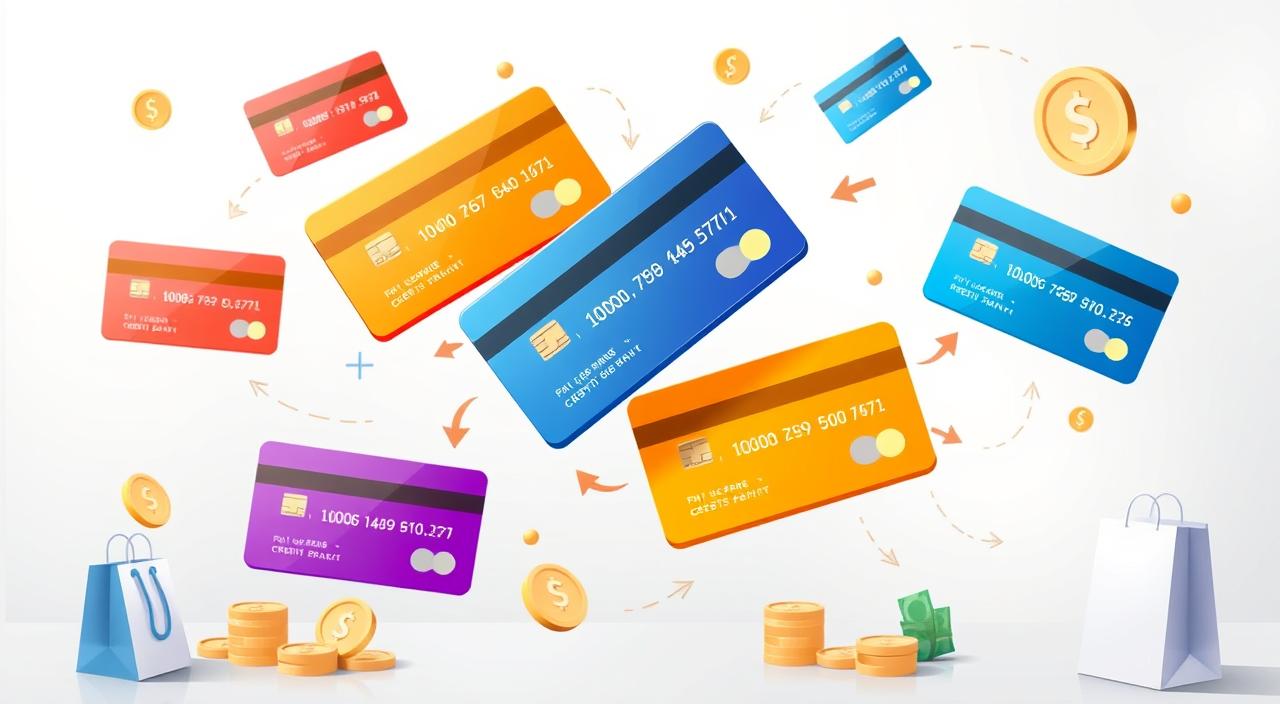Did you know your payment history is 35% of your credit score? This shows how important credit cards are for your financial future. As a beginner, learning about credit cards is key to a strong credit profile and their benefits.
Credit cards let you borrow money to buy things. You’ll need to pay it back, either all at once or with interest over time. The issuer decides how much you can borrow based on your income and credit history.
The credit card fundamentals also include the payment networks like Visa and Mastercard. They handle your transactions, making sure the merchant gets paid and your account is charged. When your statement comes, you can pay the minimum, the full amount, or something in between. Paying the full amount each month is the best way to avoid interest and understand credit cards.
Learning these credit card essentials will help you use them wisely. This will build a solid financial base. We’ll explore more about credit card 101, including different types, their benefits, and how to use them responsibly.
Understanding Credit Cards
A credit card is a financial tool that lets you buy things and borrow money from the bank. When you use it, you’re borrowing money to pay for what you buy. You then have to pay it back, either all at once or a little at a time with interest.
What is a Credit Card?
A credit card is a card made of plastic or metal. It’s used to pay for things. It has a limit on how much you can borrow, based on your income, debts, and credit history.
How Credit Cards Work
When you buy something with your card, the payment network (like Visa or Mastercard) handles the transaction. They make sure the money gets to the seller and you get billed. You can choose to pay the whole amount, the minimum, or something in between when your bill comes.
Credit Card Basics
- Credit cards give you a line of credit for buying things, moving balances, and getting cash advances.
- If you don’t pay the whole amount by the due date, you’ll be charged interest. The APR shows how much it costs to carry a balance.
- When you make payments, the bank tells credit bureaus. This can help your credit score if you pay on time.
Types of Credit Cards
There are many credit cards out there, each with its own benefits. You can find cards that offer rewards for your spending or ones with low interest rates. Knowing what each card offers can help you choose the right one for your needs.
Rewards Credit Cards
Rewards credit cards let you earn something back for your spending. You can get cash back, points, or miles for every dollar you spend. These rewards can be used for travel, merchandise, or even to pay down your balance. To get these cards, you usually need good to excellent credit.
Low-Interest Credit Cards
Low-interest credit cards are great if you want to save money. They don’t offer rewards but have lower annual percentage rates (APRs). This makes them a smart choice if you carry a balance each month. These cards are often easier to get if you have average or fair credit.
Balance Transfer Credit Cards
Balance transfer credit cards help you pay off high-interest debt faster. They offer a 0% APR for a short time to transfer your balance. But, you’ll need good credit to qualify for these cards.
Credit Cards for Average or Bad Credit
Even with average or poor credit, you can still get a credit card. These cards might have higher interest rates and fewer rewards. But, they can help you build or improve your credit over time.
Student Credit Cards
Student credit cards are made for college students with little or no credit. They usually have lower limits and fewer features. But, they’re a good way for students to start building credit and learning about money management.
Benefits of Using Credit Cards
Credit cards have many benefits for users. They help you build credit. By paying on time, you can increase your credit score. This makes it easier to get loans and better insurance rates later.
Another big plus is earning rewards. Many cards give cash back, travel points, or other perks for your spending. This way, you get something extra for using the card.
- Fraud protection: Credit cards offer better fraud protection than debit cards or cash, keeping you safe from unauthorized charges.
- Purchase protections: Many cards also protect your purchases, covering stolen or damaged items.
- Grace period: You get a grace period to keep your money in your account before the bill is due.
- Acceptance: Credit cards are widely accepted, making them easy to use for things like renting a car or booking a hotel.
While credit cards have costs like interest and fees, their benefits can be worth it. By using them smartly, you can improve your finances and enjoy the perks.
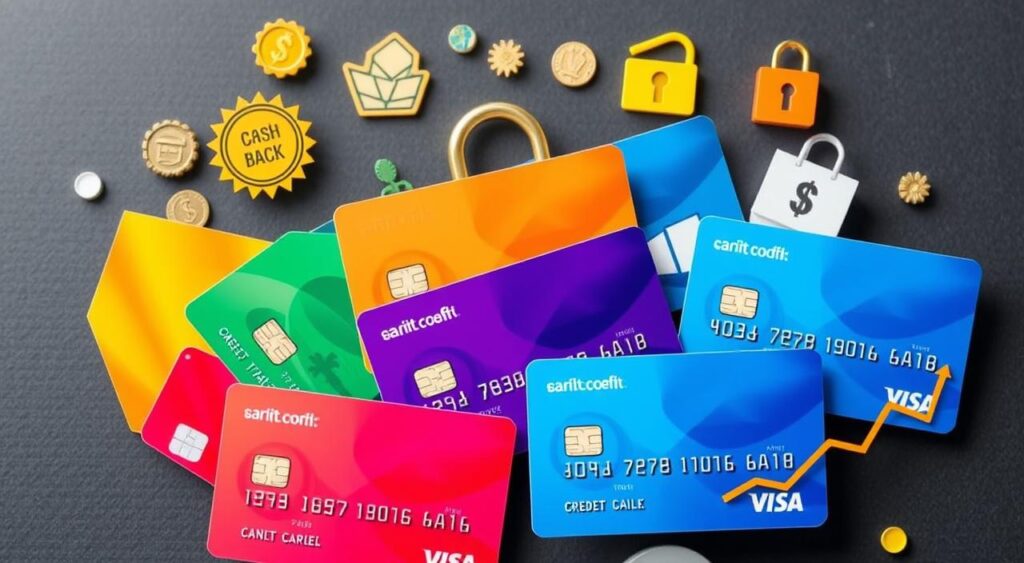
Costs and Fees Associated with Credit Cards
Credit cards offer many benefits but also come with costs and fees. The biggest cost is interest payments if you don’t pay off your balance each month. Credit cards usually have high annual percentage rates (APRs). Some cards also have annual fees, which can be from $20 to hundreds of dollars a year.
Late payment fees can add up, with a first late fee capped at $27 and a second at $38 within six months. Balance transfer fees of 3-5% are common when moving debt to a new card. Foreign transaction fees of 1-3% are often charged on non-U.S. purchases, but some travel cards don’t charge these fees.
To avoid extra credit card costs and credit card fees, pay your balance in full each month. Also, understand all the fees before applying for a credit card.
- Annual fees can range from $95 to upwards of $500 per year.
- Late payment fees typically fall between $25 and $41 when paying the credit card bill past the due date.
- Balance transfer fees range from 3% to 5% of the transferred debt amount.
- Foreign transaction fees are usually around 3% of the purchase when using credit cards outside the U.S.
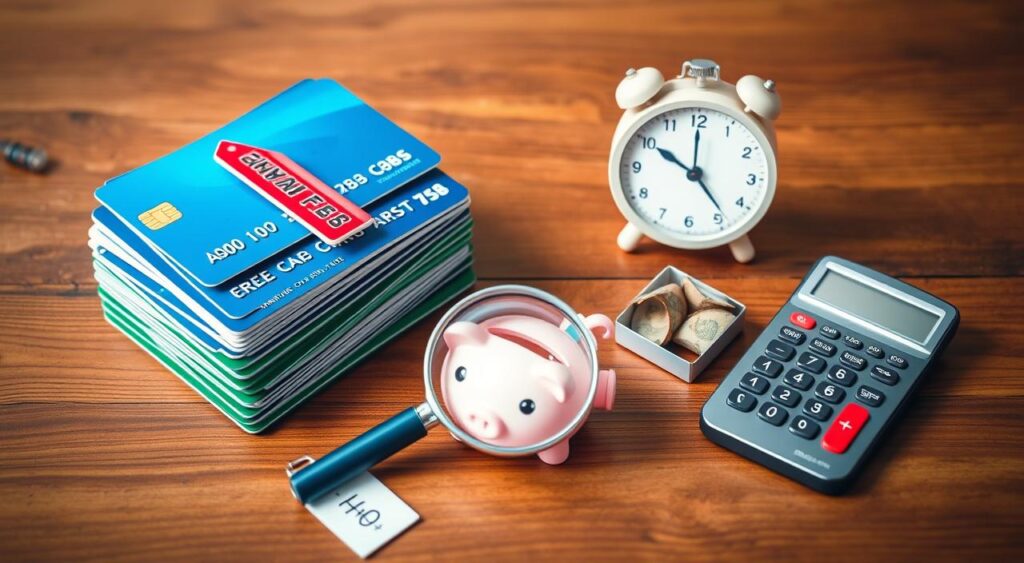
By being aware of these credit card fees and credit card costs, you can manage your credit card use well. Understanding your credit card agreement helps keep your finances healthy.
Building Credit with Credit Cards
Using credit cards wisely can help improve your credit score over time. It’s important to follow good credit habits. Here are some ways to build credit with credit cards:
Pay on Time
Payment history is 35% of your credit score. So, paying your credit card bills on time is key. Set up automatic payments or reminders to avoid missing due dates.
Keep Balances Low
Try to keep your credit card balances low, below 30% of your limit. High balances can harm your credit score.
Ask for Credit Limit Increases
After 9-12 months of good credit card use, ask for a credit limit increase. This can improve your credit score by lowering your credit utilization ratio.
Keep Accounts Open
Don’t close old credit card accounts, even if you don’t use them. Keeping them open helps your credit score by showing a longer credit history.
By following these credit building tips and using your credit cards wisely, you can improve your credit. Remember, building credit with credit cards takes time, but the benefits are worth it.
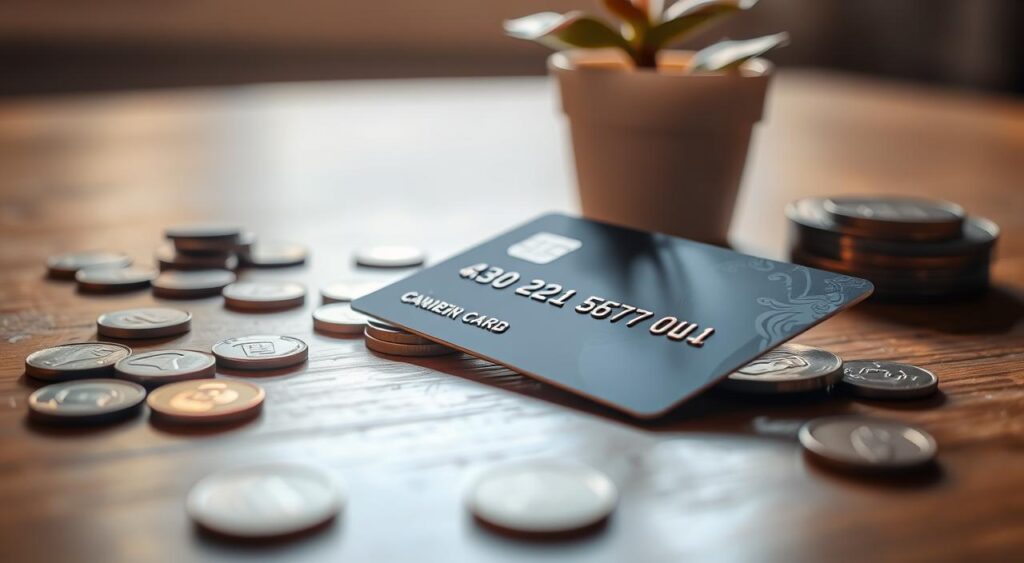
Choosing Your First Credit Card
When picking your first credit card, look for a few important features. A card with no annual fee is a good choice. This way, you can keep it open for a long time to build your credit.
Many cards also let you check your FICO credit score for free. This helps you see how your credit is improving over time.
If you have bad or no credit, consider a secured credit card. These cards need a deposit, which becomes your credit limit. As you use them responsibly, you might get an unsecured card later.
No Annual Fee
It’s smart to choose a credit card with no annual fee when you’re starting out. Annual fees can add up, especially for new credit users. A no-fee card lets you keep it open for a long time, which is key for building good credit.
Free FICO® Score Tracker
Many credit card companies offer free FICO credit score access. The FICO score is what lenders use most. This lets you see how your credit is improving and how your efforts are affecting your score.
No or Low Security Deposit
For those with bad or no credit, a secured credit card is a good starting point. These cards require a deposit, which is refundable. As you use them well, you might get an unsecured card later.
By focusing on these features for your first credit card, you can start building your credit positively. This sets you up for long-term financial success.
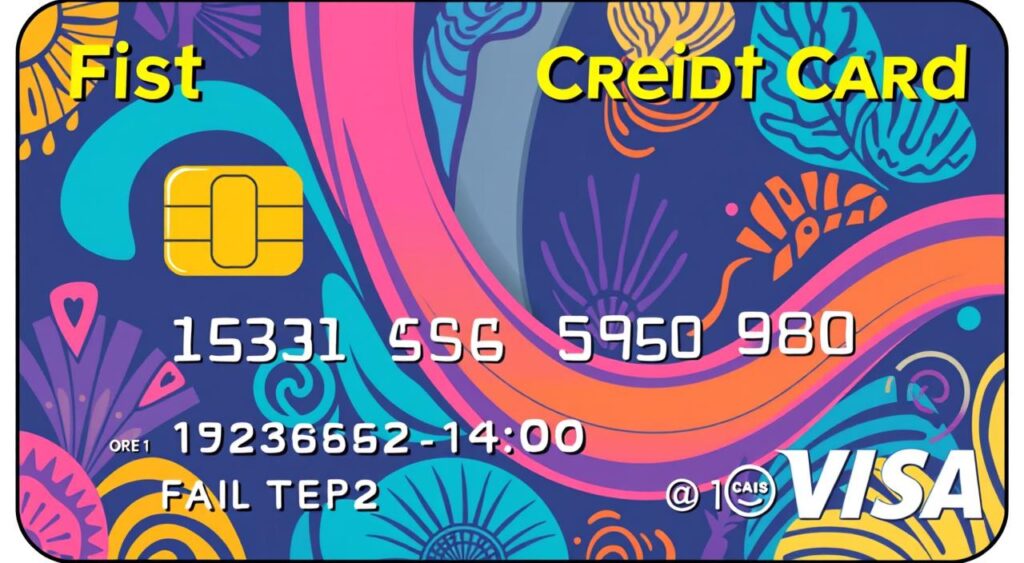
How Do Credit Cards Work for Beginners
For those new to credit cards, understanding them can seem tough. But knowing the basics is crucial for using them right. Credit cards offer a line of credit for purchases, balance transfers, or cash advances.
When you get a credit card, the bank sets a credit limit. This is the most you can borrow. Every purchase adds to your balance. You can pay the full amount to avoid interest or make a minimum payment and pay interest.
Using the card wisely can improve your credit score. It’s important to understand these credit card basics for beginners to use it well.
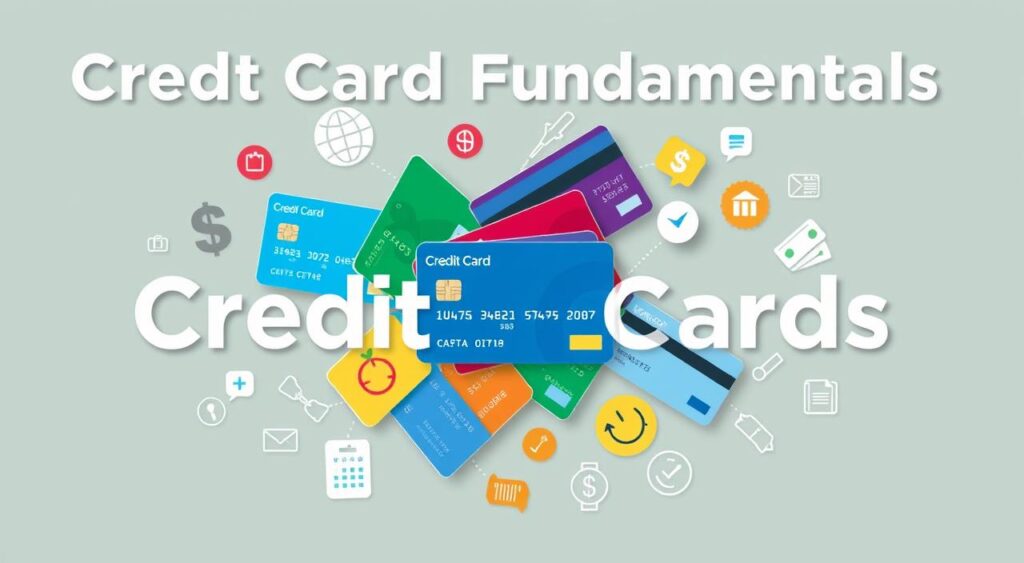
Here are a few key things to remember about credit cards for beginners:
- Credit limit: The maximum amount you can borrow on the card.
- Statement balance: The total amount you owe from the previous billing cycle.
- Available credit: The amount left in your credit limit.
- Minimum payment: The lowest amount you can pay to avoid late fees.
- Due date: The date your payment must be received to avoid interest charges.
Learning these how credit cards work for beginners concepts is key. It ensures you use your card wisely and enjoy its benefits.
Tips for Responsible Credit Card Use
Using credit cards wisely is key to a strong credit score. Follow these tips to enjoy credit card perks without risks.
- Always pay your bill on time. Your payment history is crucial, so pay the minimum by the due date.
- Keep your credit card balances low. Use less than 30% of your credit limit to avoid score drops.
- Request credit limit increases. After 9-12 months of on-time payments, ask for a limit boost.
- Avoid closing older credit card accounts. Keeping them open helps your credit history.
- Apply for new credit cards sparingly. Each new application can slightly lower your score.
By sticking to these responsible credit card use tips, you can improve your credit, dodge interest, and enjoy the perks of credit card best practices and credit card tips.
Credit Card Interest and APR Explained
It’s key to know about credit card interest and APR. APR stands for Annual Percentage Rate. It’s the yearly cost of borrowing with a credit card. This includes the interest rate and any extra fees.
What is APR?
APR shows the real cost of borrowing with a credit card. It includes the base interest rate and any extra fees. As of February 2024, the average APR for credit cards was 22.63%. APR can be fixed or variable, depending on the card.
How APR Works
For instance, if your credit card has a 20% APR and you owe $1,000, you’ll owe $1,200 after a year. This is because of the 20% interest. But, you can avoid interest by paying your balance in full each month.
Knowing how APR works helps you use credit cards wisely. It keeps you from paying credit card interest. Credit card APR varies, so always check the terms before signing up. This way, you can make smart choices and avoid high costs.
Conclusion
Credit cards are handy for buying things and building credit. But, it’s crucial to know how to use them right. A credit card lets you borrow money up to a certain limit. You can pay off the full amount each month to avoid interest, or carry a balance and pay interest.
Using your credit card smartly helps you keep good credit. This means making payments on time, keeping your balance low, and being careful when applying for new cards. This approach helps you build and keep a strong credit score.
For beginners, using credit cards wisely opens up many benefits. These include rewards, protection against fraud, and easier tracking of your spending. Knowing the credit card basics summary and credit card fundamentals recap is essential. It helps you use credit cards effectively and avoid common mistakes.
Credit cards are everywhere, and using them responsibly is a quick way to improve your credit. By using them smartly, beginners can access many financial benefits. They also get the convenience and security that credit cards offer.
FAQ
What is a Credit Card?
How Do Credit Cards Work?
You can choose to pay the minimum, the full amount, or something in between. This lets you manage your payments.
What are the Different Types of Credit Cards?
There are also cards for people with bad credit that help you build your score. And there are student cards for college students who need a co-signer to get one.
What are the Benefits of Using Credit Cards?
Many cards give you cash back or travel points for your spending. They also protect you from fraud better than cash or debit cards.
What are the Costs and Fees Associated with Credit Cards?
Late payments can cost you up to $38. Some cards charge a fee for transferring balances. And, there are fees for using them abroad.
How Can I Build Credit with Credit Cards?
After 9-12 months, ask for a credit limit increase. This can help you keep your balance low. It’s also good to keep old accounts open to show a long credit history.
What Should I Look for in My First Credit Card?
If you have bad credit, consider a secured card. It requires a deposit but can help you start building credit.
How Do Credit Cards Work for Beginners?
Each purchase adds to your balance. You can pay the full amount to avoid interest or make a minimum payment. This will accrue interest.
What are the Tips for Responsible Credit Card Use?
After 9-12 months, ask for a credit limit increase. This can help your credit score. Don’t close old accounts, as they show a long credit history. And, apply for new cards carefully, as it can lower your score.
What is APR and How Does it Work?
But, you can avoid interest by paying your full balance each month. This keeps your costs down.

